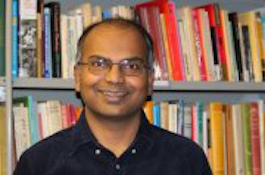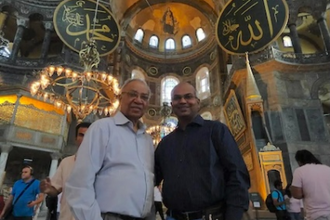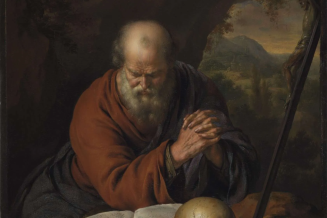Beautiful spiritual lessons from Hajj: The journey of a lifetime!

Fr Victor Edwin SJ
Dear Christian Brothers and Sisters:
Eid Mubarak!
You must be wondering what am I saying to you. I am wishing you a happy feast. I am wishing you a happy feast of sacrifice. Muslims all over the world celebrate a feast called Eid ul Adha which is commonly called as Bakrid.
You must have heard from your Muslim friends about this feast. Some of you might have even be invited for a meal at their home. One of the five pillars of Muslim spirituality is Hajj: pilgrimage to Mecca. Many of the rights of the pilgrimage are associated with Bibilical patriarch Abraham and Hajj is the heart of the Islamic way of life. You will find a beautiful description of Hajj in the Quran (Q. 22: 26-38).
The Quran teaches that a Muslim who has sufficient money and good health must make the Hajj pilgrimage to Mecca at least once in their lifetime.
Every year, during the Islamic month of Dhul Hijjah, the five days of the month are designated for Hajj. With modern transportation, people can easily reach on time. In the olden days, people had to travel for months on foot, camel or horse or ship to perform the Hajj.
Muslims who are performing the Hajj, before entering into the premises of the Kaaba, the square building, they enter into a particular type of dress called Ihram which is a simple dress, women too wear a simple dress with a head scarf. The Ihram comprises two pieces of unstitched cloth, one that covers the hip and one that covers the upper part of the body. This white garment that signifies the absolute equality of all men and women before God.
As I said, the rights of the pilgrimage are associated with Abraham and the first important right is called the Tawaf. Tawaf is going around the Kaaba seven times in anti clockwise direction. Muslims believe that Abraham and his son Ismael went around the Kaaba seven times worshipping one God.
The second ritual is called Sayee where the pilgrims run between two hills, Al Safa and Al Marwah. This is to remember Hagar running up and down to find some water for her child who was crying out of thirst. Then an angel appeared and showed a spring from where Hagar and her child drank the water. And then the pilgrims progress towards Mina where they stay the night and next day at sunrise proceed towards the plains of Arafat. This is a very important day as the pilgrims enter into the heart of the Hajj.
Muslims believe that Adam and Eve reconciled with God at this place. And Prophet Muhammad (Pbuh) delivered his final sermon at Arafat.
Muslims believe that God imposed upon himself the law of mercy (Q. 6: 12).
Every individual must take advantage of God's mercy and ask for pardon and forgiveness. It is an intense moment as the pilgrims stand on the plain of Arafat and pray for forgiveness. It is not just about asking forgiveness, the person must acknowledge and recognise one's sins, and remember the sins in front of God with humility. It is the deeper awareness that these sins must end. They must resolve that with God's help, they will not sin. They have to make a recompense and put right the bad effects of their sins and with intensity and humility ask for forgiveness. Also in Arafat, the Muslims stand as if they are anticipating the Day of Judgement (Q. 6: 21-31).
Then the pilgrims move to a place from Arafat to Muzdalifa and spend the night there. After collecting some pebbles there, the pilgrims proceed to Mina where they have to stone the three pillars, symbolically representing the satan in their lives. By stoning the pillars, the pilgrims reject the satanic, negative traits and temptations within them.
There are several things that Christians can be inspired from this beautiful religious Islamic practice of Hajj. But I would like to narrate two beautiful stories that reflect the mind and heart of a Muslim who is preparing to make the Hajj journey.
As a student of theology, I had the opportunity to meet with Fr Etienne Renaud, a professor at the Pontifical Institute for Arabic and Islamic Studies in Rome. He was on a visit to India and I met him at the Henry Martyn Institute. In our conversation about Hajj, he narrated to me a life transforming experience, a touching story that transformed his life. As a young priest, he went to Tunisia to learn Arabic. He was staying as a paying guest with a Muslim family and the man of the house was teaching him Arabic. Fr Etienne said that he came to know that the man who was teaching him Arabic was preparing to go for Hajj. So he told his teacher, "I heard that you are going for Hajj, so I would like to go back to France for a few weeks and will return once you are back. "
The man said: "Father, wait a minute. Insha Allah, I'm going for Hajj, but while I am away on the Hajj, in our culture, the wife and the children go to her parents' house. My wife and children will be unable to go to her parents' house as they are not there at their home. As you are here, I thought I will request you to take care of my family while I am away for the Hajj."
Fr Etienne told me that he was deeply moved by the love and trust that a Muslim family had on him.
The second story is from Delhi. I was told about a Muslim cycle rickshaw driver. I call him cycle rickshaw brother. It seems that he was saving money for many years from his meagre income because he wanted to go on the Hajj. He was single and had no family. After collecting enough money he applied for the Hajj formalities. His name was selected and all was confirmed that he would perform the Hajj.
But a month before he was to proceed on the Hajj journey, a motorcyclist, probably in an inebriated state hit his cycle rickshaw while he was peddling. He had a broken leg. Many of his friends we're disappointed that he had made all the arrangements for the Hajj and the accident had put him in bandages.
A friend of mine visited this cycle rickshaw driver. The cycle rickshaw driver told my friend, "Inshallah if God wills, I will go for the Hajj. " Such tremendous trust in God!!!! When I heard the story, I was moved to tears thinking about this man' tremendous trust and obedience to God's will. Whatever happens is God's Providence. The cycle rickshaw driver had surrendered himself with his heart and soul to God. Everything happens by His Providence. What a wonderful mantra for our life!
As a Christian reflecting on this Muslim practice of Hajj, my heart is drawn to the Biblical figure of Abraham. Muslims identify their God as God of Abraham. The Catholic Church in the Vatican II document Lumen Gentium 16 clearly stated: " ... Muslims, who, professing to hold the faith of Abraham, along with us adore the one and merciful God, who on the last day will judge mankind." it's a very significant point. Both traditions seeing themselves worshipping the God of Abraham shouldn't be ignored (Paul Hedges).
St Paul in his letter to Galatians (3:6-9) reflects on the quality of the faith of Abraham. "Abraham believed God, and it was credited to him as righteousness. Understand, then, that those who have faith are children of Abraham. Scripture foresaw that God would justify the Gentiles by faith, and announced the gospel in advance to Abraham: "All nations will be blessed through you." So those who rely on faith are blessed along with Abraham, the man of faith.
Abraham is the father of all those who believe, Jews, Christians and Muslims. Why is he our father in faith? Abraham's faith consists in obedience and trust. God asks Abraham to leave his home and go to a land that He showed him (Genesis 12). Away from his community, away from his people, clan and culture, he trusted God and left everything to do God's will. God said that "I will make your descendants a great nation." This promise from God was made when Abraham was childless. But Abraham trusted God. His son Ismael is sent to the wilderness and with Isaac with him, God asked Abraham to sacrifice his son Isaac. Abraham was obedient and trusted him. God can raise the dead to life ( Romans 4, 24). So what do we learn from Abraham's life? He allowed God to be God in his life.
The beautiful experiences that I narrated as told to me by Father Etienne and the touching story of the cycle rickshaw driver also convey the message of how people allow God to be God in their lives. Millions of Muslims who perform Hajj every year allow God to be God in their lives. They have tremendous trust in God and His mercy.
Dear brothers and sisters, so Bakrid or the day of Eidul Adha is a beautiful day to reflect on the presence of God in our lives and the communities, to reflect on our own sinfulness and our own limitations and seek God's forgiveness in our lives.
Yours sincerely
Joseph Victor Edwin SJ
Vidyajyoti College of Theology
Delhi 110 054
INDIA


















